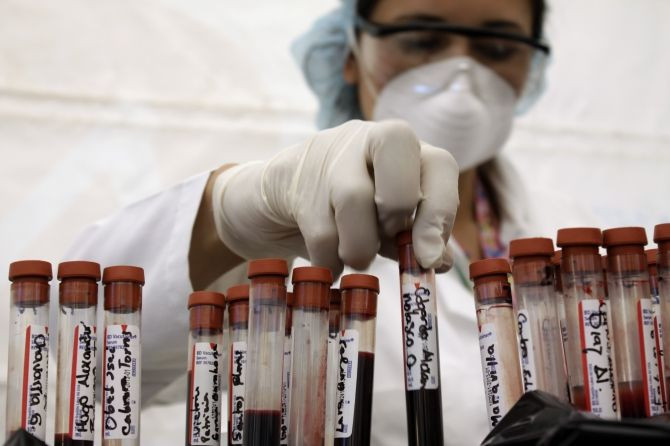In Midst of Washington DC's HIV Epidemic, City Pays People to Get Tested

Washington, DC has been especially hard hit by HIV and AIDS in recent years. One statistic says that 3 percent of residents in Washington, DC are infected with HIV; some place it as high as one in 20 residents, which would place the city on par with some of the worst plagued areas of sub-Saharan Africa. As many as 40 percent of people who are infected with HIV do not know they have it.
But the District of Columbia, in full knowledge of these statistics, is trying some innovative methods to lower the number of people who don't know they have HIV. In an effort to find the 5,000 some residents who have HIV but do not know it, the city is now offering tests in some unlikely places – the grocery store, high schools, the department of motor vehicles, street corners where there are a high percentage of addicts.
And it is paying people to take them.
Perhaps Phill Wilson, president and CEO of the Black AIDS Institute put it best: it is truly a tale of two cities.
The city's efforts, in collaboration with the local non-profit organizations, are paying off. They pay people seven dollars to take the test, and rates of HIV infection and transmission have been falling in kind. New cases have fallen nearly 25 percent, from 1,103 in 2006 to 835 today.
Area non-profits are jumping on the bandwagon as well. Whitman-Walker Health, a community health center in Washington, DC, has a van that they park outside of nightclubs, homeless shelters, and grocery stores. Inside the van, they conduct drug testing, and they say that it is an immense success.
The number of HIV tests has nearly tripled, from 43,000 in 2007 to 122,000 in 2012. The city has given away 5 million male and female condoms last year. More than 300,000 clean needles are handed out to various at-risk demographics, like heroin users and transgender prostitutes who inject themselves with hormones.
The city faces some opposition. Some family doctors, who can treat as many as three generations of the same family, are reluctant to test their patients. And the city has run into the wall of random testing, in which only one or two in 100 people will test positive. The city has more success with "contact testing," in which patients who have tested positive are asked to name everyone with whom they have had sex. While the city can typically only contact a third of those people, 10 percent will test positive for HIV. And, though some patients are uncooperative, incentives do help – movie tickets or 10 dollars go a long way.
On Sunday, the International AIDS Society is hosting its biannual conference, prompting the arrival of 20,000 preeminent AIDS researchers and scholars. Though AIDS was first spotted in the United States 31 years ago, it is the first time in over 20 years that the event has been hosted by the United States. This re-arrival is due – in large part – to the quiet relaxing of Reagan-era immigration laws by the Obama administration that forbid carriers of AIDS and HIV from entering the country.
In advance of the event, AIDS experts expressed hope that they could find a cure for AIDS within a generation.
Published by Medicaldaily.com



























